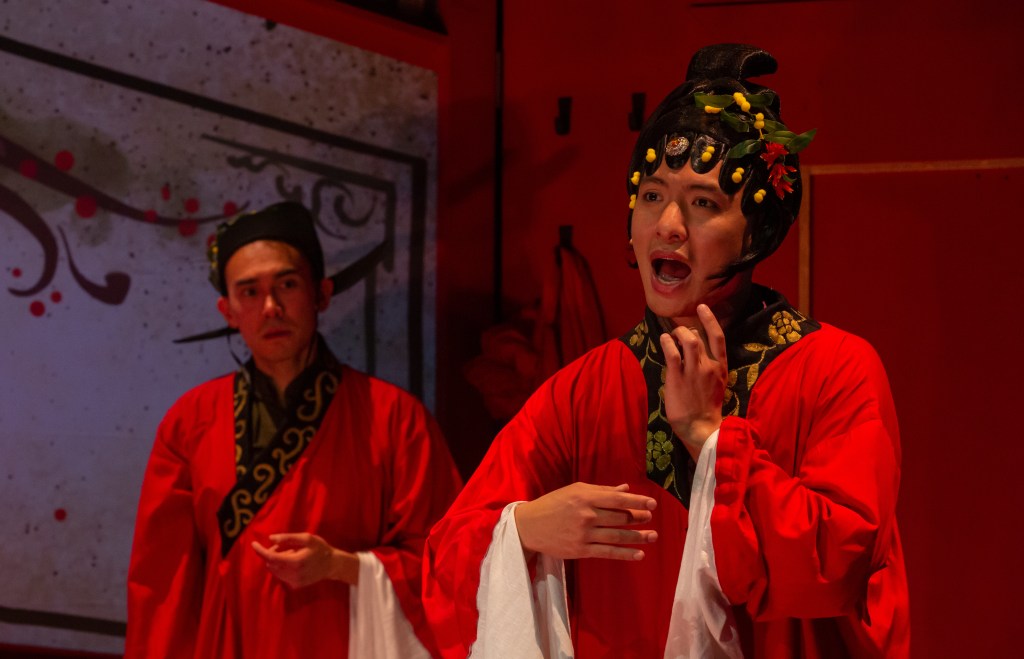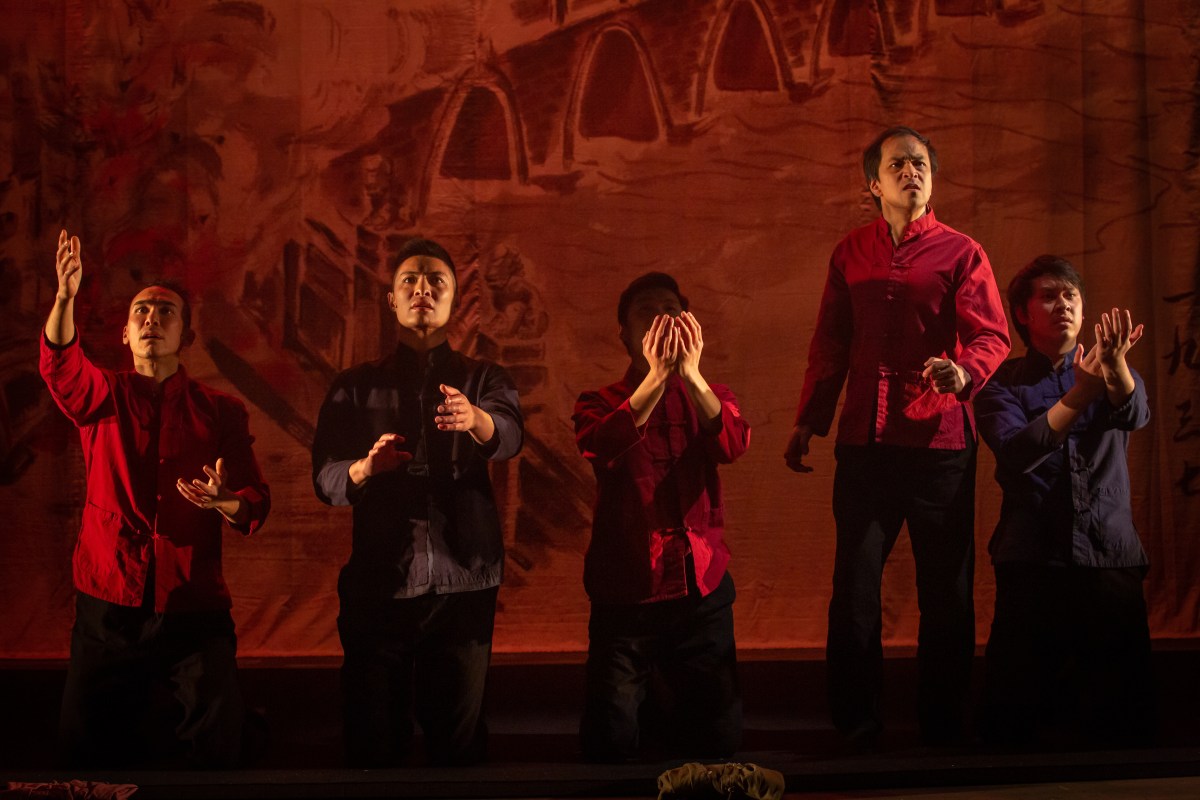Performer, theatre maker and writer Anna Yen, born and raised in Queensland, wrote Slow Boat to celebrate her father’s story as an immigrant arriving in Australia at the end of the World War II.
As a teenager, she tried to discuss with him how he came to Australia but, as with so many migrants before him, he was tight-lipped. It was only after his death that she followed his trail, discovered a fascinating story of hardship and hope, and decided to turn that into a play.
With a group of Chinese men, Yen’s father escaped war-torn, poverty-stricken China in the late 1930s. Arriving in Nauru by boat, the men mined phosphate in harsh conditions. As Japanese control of the Pacific expanded, some 580 Chinese were hastily evacuated from Nauru to Australia in 1942.
On arrival, Yen’s father and his ‘brotherhood’ of five friends were sent to mine tungsten at Hatches Creek, north of Alice Springs. Soon after that they were indentured by General Douglas MacArthur to work for the US war effort building boats in Brisbane.
The story is full of trials and challenges, peppered with the gritty determination of six men trying to find acceptance and eventually settling permanently in Queensland. Perhaps of more interest to Anna Yen was the discovery that her father and friends had held concerts to entertain themselves and perpetuate their culture since their days on Nauru. These concerts continued in the Northern Territory and at the Bulimba Docks and became the basis around which she structured her play and their remarkable story.
In this world premiere production, Yen has built the story as ‘a play within a play’, using her actors to tell their real-life characters’ individual and collective journeys as a piece of theatre. Narrative, vaudeville, musical theatre, Cantonese opera and Chinese music are woven together in a fun and accessible format.
Director and Dramaturg Ian Lawson, alongside Ensemble Director Therese Collie, have done a fine job in bringing this fascinating tale to life. We meet the men at the Bulimba docks in 1945. After awkward introductions and some humour with the audience, the men reproduce extracts from their earliest amateur and cringeworthy shows in Nauru through to the much slicker concerts years later in Australia. On the way we learn about their various spiritual and physical journeys and their differing perspectives on life.

Lawson’s attention to detail in delineating his characters, plus his use of stage settings to keep the action moving from one short scene to the next, is well managed. He directs the concert sections on the inner stage, including the one piece of Cantonese opera, with accuracy. Dramaturgically, the narrative can be difficult to follow at times, thanks to a word-heavy text which probably needs to be cut by at least 30 minutes to avoid seeming repetitive.
Read: Theatre review: Holding Achilles
The production is greatly assisted by Josh McIntosh’s well-placed set design with its cardboard cut-out proscenium arch stage, front curtain and painted set pieces – including a red and gold Chinese opera setting – and some cleverly imagined crowded boat and train journeys. Beautiful pastel-coloured backdrops, painted by Echo Wu, are effective in representing the period.
The production is very well lit by David Walters, who moves with alacrity from indoor to outdoor settings, from darkened transports and tents to hot deserts, while providing the indoor glow of the stage within a stage. Costumes (designed by France Foo) are extensive and appropriate, with a basic ‘coolie’ outfit for the five actors, quick changes of western and Chinese wear and stage outfits.
Musical Director and composer Nicholas Ng has produced a marvellous score of original Chinese music that works perfectly. A specialist erhu (a two-stringed Chinese fiddle) player, Ng plays the instrument beautifully while accompanying some of the songs and the Cantonese opera section. He also plays piano. Yuren (Cara) Chen performs on the traditional Chinese zither, the Guzheng, with its ethereal sound. Anna Kho plays classical percussion and jazz vibraphone. Ziwei Wang is an excellent bamboo flautist. All are first-rate musicians and add immensely to the performance.
The cast play their real-life characters with commitment and vigour, while also embodying a range of roles, both Chinese and Australian, as required. Their strongly accented spoken Chinese made it sometimes difficult to decipher their words, however.
The Master of Ceremonies Gong Saang, played by Julian Wong, does his best to keep the ‘show within a show’ on track and avoid arguments between the cast. Possibly Yen’s father, though that is never stated, Wong gives the audience a chronological timeline, helping the action along and coaxing his cast to behave well. His finely modulated voice and calm demeanour add to an excellent performance.
Jonathan Chan is Lihn Giht, an optimistic if volatile character with a fine tenor voice. The Chef, Ah Faat, is a quiet, honest character and played well by Egan Sun-Bin. Ming Yang Lim is Waih Jai, a younger man with family issues at home, often homesick and moody.
Silvan Rus is Luhng Goh, opinionated and found to have betrayed his friends with the bosses. His remorse in a scene of repentance after a suicide attempt, is moving. Musician Nicholas Ng also plays Dak Sing.
Read: Theatre review: Fourteen
With its all-Chinese cast, Slow Boat is a powerful story about acceptance and resilience, highlighting the importance of friendship and cultural identity. It also touches on some ugly truths including racism, inequality, conflict and suicide.
Yen has used her own Chinese family history to showcase the trials and tribulations that many before us have endured in order to reach these shores. It is a pertinent and timely story for our times.
Slow Boat by Anna Yen
Presented by Brisbane Festival, Brisbane Powerhouse and Playlab Theatre
Director/Dramaturg: Ian Lawson
Ensemble Director: Therese Collie
Musical Director/Composer: Nicholas Ng
Movement Director: Anna Yen
Set Designer: Josh McIntosh
Lighting Designer: David Walters
Costume Designer: France Foo
Backdrop Artist: Echo Wu
Musicians: Yuren (Cara) Chen; Anna Kho; Ziwei Wang and Nicholas Ng
Cast: Jonathan Chan, Ming Yang Lim, Nicholas Ng, Egan Sun-Bin, SIlvan Rus, Julian Wong
Voice Over actor: Brian Probets
Tickets: $39-$45
Slow Boat plays until 10 September 2022, as part of the Brisbane Festival.





